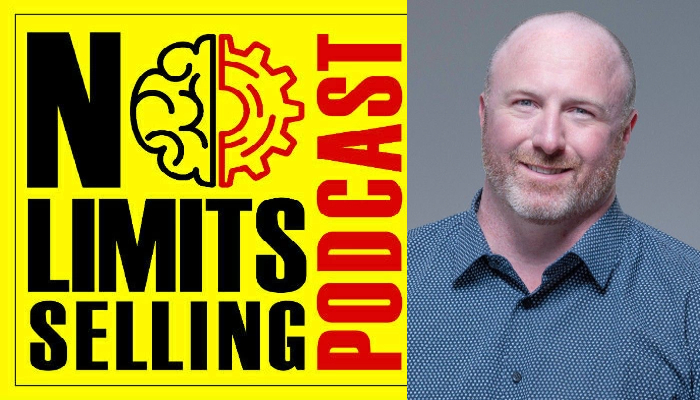How To Build High Performing Teams
On Episode 266 of The No Limits Selling Podcast, we have Dave Dubbin with us. Dave is a force in the Toronto Real Estate market and he isn’t stopping anytime soon. Born and raised in the city’s west end, he’s not only an area expert but has a unique background that gives him a fresh perspective — one that greatly benefits anyone who chooses to work with him. In this episode, Dave shares with us tips on how to build high performing teams.
Guest Bio:
Dave’s professional career began in Australia and Germany working as a professional water skier and stunt performer. In doing so, he quickly learned how to navigate the planet, the people on it, and everything in between. These experiences, combined with his formal education MBA, helped immensely in Dave’s transition into the corporate business world. While honing his craft in the Fortune 500 environment, he refined his skills as a negotiator and truly learned what it takes to be a world-class salesman.
The next step, in a series of increasingly successful moves, was to go into business for himself, to focus on what has become his greatest passion, working with people and creating high performing teams. That exact passion and need for helping others instantly drove him to real estate, where interacting directly with his clients, and creating trusting and lasting relationships, fuels Dave’s desire to succeed in helping clients make the best choice for them.

Find Dave Dubbin: Website, LinkedIn
[EDITOR’S NOTE: This podcast is sponsored by No Limits Selling. It is a fun, fast-paced podcast that delivers hard-fought business advice that you can implement today to improve your sales and performance]
Interested In Our Real Estate Coaching Services? Explore Our Website: Link
Feeling Not Well Today? You Can Use Our Mindset Boosters App To amp Up Your Mood: Link
Find us on Social Media:
LinkedIn | Facebook community | Instagram
Like what do you listen to? Subscribe to our podcast!
Ready to become fearless? We can help you become fearless in 60 days so you accomplish more in your career Schedule A 15 min Call with Umar
Summary
Introduction
In this episode of the No Limits Selling Podcast, host Umar Hameed interviews Dave Dubbin, a real estate professional passionate about helping others find their calling and adding value to the world. They discuss the importance of passion, intent, and building a positive culture within a high performing team. They also explore the role of fear and how it can be overcome to achieve success. Dave shares his experiences from his athletic background in water skiing and coaching, as well as his insights from the real estate industry. Here are some tips shared by Dave on how to build high performing teams.
The Power of Passion
- Passion is evident in the energy and enthusiasm someone exudes when they speak about their interests.
- In today's age, people are more open to self-reflection and discovering their passions, which can evolve.
Building a Positive Culture
- A great leader focuses on creating a team culture centered around shared values and goals.
- Each team member has their own business within the team, and collaboration is key to delivering the best possible results for clients.
- Setting boundaries with clients is important to maintain work-life balance and avoid burnout.
Intent and Mindset
- Intent plays a crucial role in achieving success. Having the right mindset and intent can propel individuals and teams forward.
- Recognizing individual strengths and finding common goals are essential for building a cohesive team.
Reflection and Learning
- Boosting confidence in team members who can't see their greatness involves revisiting past successes and highlighting personal growth.
- Learning from failures and analyzing what went wrong without self-criticism can lead to improvement.
Communication and Adaptation
- Effective communication requires understanding and adapting to different communication styles and preferences.
- Being present and giving undivided attention to others fosters stronger connections.
Balancing Fear and Action
- Fear can be channeled positively to enhance performance and achieve goals.
- Acknowledging fear in sales and taking action despite it can lead to unexpected positive outcomes.
The Importance of Fundamentals
- Reflecting on and recommitting to the fundamentals of any field, whether sports or sales, helps maintain excellence.
- Revisiting the basics allows for continuous improvement and growth.
Happiness and Mindfulness
- Finding joy in helping others and making a positive impact brings happiness.
- Being present, enjoying the company of loved ones, and setting boundaries contribute to overall happiness.
Mind Hack: Singing to Overcome Overthinking
- Singing a favorite song can help relax the mind and body, allowing for better performance and reducing tension.
- Breathing deeply while singing provides the body with oxygen and promotes relaxation.
Conclusion
In this engaging podcast episode, Dave Dubbin shares insights on finding passion, building high performing teams culture in a positive environment, overcoming fear, and maintaining focus on fundamentals. The importance of intent, effective communication, and embracing failures as learning opportunities are highlighted. Listeners are encouraged to embrace their passions, find balance, and leverage mind hacks to improve performance and achieve happiness and success.
Faq
Who is Dave Dubbin?
What is Firm Solutions?
What challenges did Dave Dubbin face when starting Firm Solutions?
What is Dave Dubbin's leadership style?
How did Dave Dubbin overcome the challenges in his entrepreneurial journey?
What advice does Dave Dubbin have for aspiring entrepreneurs?
What are Dave Dubbin's future plans for Firm Solutions?
Where can I listen to the full podcast with Dave Dubbin?
Don’t miss this opportunity to transform your real estate career with one-on-one coaching. As an experienced real estate coach, I, Umar Hameed, am dedicated to helping you unlock your full potential and achieve your real estate goals. To learn more about who am I and my clients ↓
If you’re ready to take the next step, book an appointment with me today and begin your journey toward success in the real estate industry.
